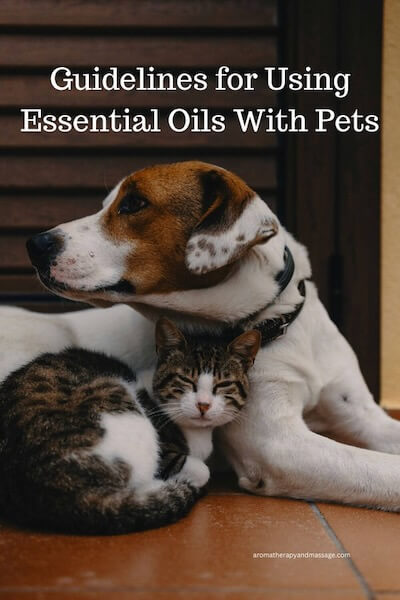As an affiliate for Bookshop, Amazon, and other programs, I may earn a small commission for products purchased through links. This doesn't affect the price you pay. Privacy policy and disclosures.
Search this site:
Using Essential Oils For Pets
Using essential oils for pets can help get rid of bad odors, support your pet's immune system, prevent yeast and mold growth, and repel insects. You may also be able to treat mild ailments, such as skin inflammations, itchy skin, rashes, bad breath, flatulence, and motion sickness.
Are Essential Oils Safe for Pets?

The short answer is that some essential oils, when properly used, are safe for pets and some are not. And it depends on the animal. Therefore, you must educate yourself about safe essential oils for specific animals, learn how to appropriately dilute and use the oils, and observe your pet's reactions.
Animals have a much more acute sense of smell than you do, and some pets may react badly to essential oils.
Use a mild blend at first and observe the results. Tearing eyes, sneezing, pacing, or whining are all signs that your pet finds the scent overwhelming. Dogs or horses may rub their head on the ground and cats may excessively lick themselves to escape the smell.
Consult your veterinarian before using essential oils on pets, especially if the animal is very young or old or has an ongoing medical condition. However, some vets are not trained in the use of essential oils, so make sure your vet is.
Basic Guidelines for Using Essential Oils for Pets
Animals are much more sensitive to essential oils than humans. Plus, each animal is an individual and may be more or less sensitive than others.
One suggested process for introducing essential oils to pets is to let your pets choose which oil they like. With the cap on the essential oil, let your pet have a sniff. Watch the animal's reaction and behavior—it can tell you yes, no, or maybe (neutral). Positive results may be subtle.
To avoid skin irritation, always dilute essential oils with a carrier oil before applying them to your pet. Dilution rate depends on the oil and the type of pet. Start with the oils more diluted. You can increase the concentration next time if the application does not have the desired effect and your pet shows no adverse effects.
Monitor for your pet for adverse reactions after applying a new essential oil. If you notice irritation, stop using the oil immediately. However, do NOT rinse with plain water, as it can worsen the irritation. Instead, rinse with a carrier oil, full-fat milk, or very soapy water to neutralize the effects.
Keep essential oils away from your pet’s eyes, lips, genitals, and anus.
When diffusing a new oil, always observe your pet’s behavior for the first 20 minutes or so.
Essential Oils for Dogs and Cats
Some essential oils safe to use with both cats and dogs, according to the American College of Healthcare Sciences (ACHS):
- Cedarwood (Juniperus virginiana)
- Frankincense (Boswellia carterii)
- Helichrysum (Helichrysum italicum)
- Lavender (Lavandula angustifolia)
- Lemon (Citrus limonum) – do not overuse
- Orange (Citrus sinensis) – do not overuse
- Peppermint (Mentha x piperita) – do not overuse
- Petitgrain (Citrus aurantium)
- Roman chamomile (Chamaemelum nobile)
- Turmeric (Curcuma longa)
For more details about what you can and cannot use, along with aromatherapy blends, see complete articles on essential oils for dogs and essential oils and cats.
Essential Oils for Horses
Horses can benefit from essential oils. See essential oils for horses.
Essential Oils for Birds
Veterinarian Dr. Janet Roark offers the following tips for birds in Essential Oils and Safety for Pets.
Birds are extremely sensitive to essential oils. Roark suggests the best way to use oils with birds is diffusion—2 to 3 drops in a water-based diffuser, rather than one that pulls oils directly from the bottle. Monitor the bird for the first 5 to 10 minutes of diffusing.
Only use a diffuser in an open room or well-ventilated area. Do not place the diffuser directly next to a small-habitat bird enclosure, do not diffuse for long periods of time, and allow the bird access to leave the area, if possible.
If you want to use essential oils topically, which some sources recommend against, Roark suggests water misting. Use 10 to 20 drops of essential oils in 4 ounces (1/2 cup) of water (Shake well before each use).
Roark states oils commonly used with birds include citrus (orange, lemon, bergamot, etc.) and the calming oils of lavender, frankincense, helichrysum, and roman chamomile. She suggests avoiding hot/spicy oils (such as clove, cinnamon, or ginger).
Hydrosols are also an option for birds and are discussed in Hydrosols: The Next Aromatherapy.
I recommend working with a professional if you want to use essential oils with birds or with small mammals such as rabbits, guinea pigs, ferrets, etc.
Suggested Books
Essential Oils for Animals by Nayana Morag
Holistic Aromatherapy for Animals by Kristen Leigh Bell
JennScents Aromatherapy Guide for Pets
Buy essential oils from Aromatics International (recommended).
Rocky Mountain Essential Oils.
Photo Credit:Photo by Alec Favale on Unsplash



